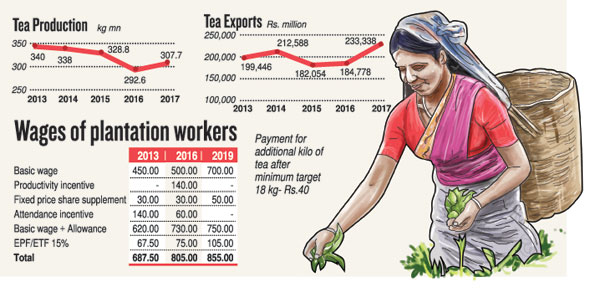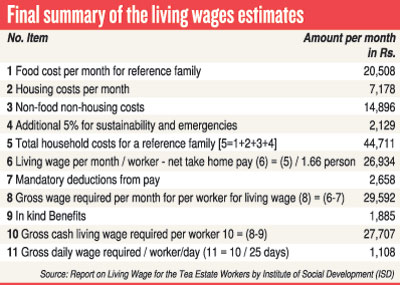News
Unions dangled a ‘dream’ wage for tea workers but reneged on promise
Trade unions led tea plantation workers to “dream” a Rs. 1,000 daily wage was right and achievable during two years of protests before unaccountably signing off this week on a Rs. 700 wage – a mere 20-rupee increase in take-home pay –plantation worker Jeyaram Marimuttu from Theliwatta, Patana in the Central Province, said.
“This basic wage increase to Rs. 700, while scrapping other allowances, is not going to make any significant impact on our pay compared to the previous agreement. The only increase is merely Rs 20. The trade unions went ahead and signed the agreement without consulting us or even considering our plight. They betrayed us,” Mr. Marimuttu said.
He finds it increasingly difficult to support his six-member family on his Rs. 16,100 monthly wage and is looking at how he can make some extra money.
For the past two years, plantation workers have come out in public protests against their low wages, the most recent being a demonstration near the Gas-Paha junction in Colombo last week.
 What Mr. Marimuttu cannot accept it that the new wage agreement was signed in the presence of Prime Minister Ranil Wickremesinghe on Monday at Temple Trees after two of the three unions of the trade union joint committee – the Ceylon Workers’ Congress (CWC) and Lanka Jathika Estate Workers’ Union (LJEWU) – agreed to the basic wage increase proposal by plantation companies.
What Mr. Marimuttu cannot accept it that the new wage agreement was signed in the presence of Prime Minister Ranil Wickremesinghe on Monday at Temple Trees after two of the three unions of the trade union joint committee – the Ceylon Workers’ Congress (CWC) and Lanka Jathika Estate Workers’ Union (LJEWU) – agreed to the basic wage increase proposal by plantation companies.
“It is unfortunate that Prime Minister Wickremesinghe, who promised to get us a daily wage of Rs. 1,000 at a UNP election rally in Talawakelle ahead of parliamentary elections in 2015, chaired this event of signing the agreement,” Mr. Marimuttu said.
The third trade union grouping, the Joint Plantation Trade Union Centre (JPTUC), a collective of 10 unions that represents thousands of up-country workers, refused to sign the collective wage agreement, saying it was inadequate and came at the expense of terminating other allowances and omitting key clauses on outstanding arrear payments from October last year after the previous agreement lapsed.
JPTUC General Secretary S. Ramanathan said plantation workers were disappointed that the other two unions accepted the agreement without considering the betterment, livelihood and the rights of the workers they claimed to represent.
“There were many shortcomings in the collective agreement. I urged the other two trade unions to take enough time to study the draft which was sent to us by Employers Federation but they went ahead and signed the agreement,” said Mr. Ramanathan, a veteran trade unionist who has been involved in wage negotiations of plantation workers over the past 20 years.
On Thursday last week (January 25), negotiations commenced in the morning between union representatives and plantation companies and went on until evening without any consensus being reached except the basic wage increase to Rs. 700.
The unions demanded that other allowances for workers should be given and stipulated in the agreement along with a mechanism to pay outstanding salaries for workers since October last year after the previous agreement lapsed.
In order to pay the outstanding salary of three months to the workers, the government decided to resolve this dispute by investing Rs. 100 million of taxpayers’ money through Sri Lanka Tea Board (SLTB) with plantation companies agreeing to put in another Rs. 50 million.
Confirming the intervention of Tea Board, Chairman Lucille Wijewardena said a cabinet paper on the matter would be submitted in near future to allocate funds from Treasury. “It is too early to comment on this initiative now,” she said.
JPTUC leader Mr. Ramanathan claims the mechanism on payment of these outstanding salary payments to workers was not included in the collective agreement but in a separate letter was attached that says workers would be given a “ex-gratia payment”, giving the impression that this was a favour extended voluntarily by plantation companies.
“Usually both parties sit together at the negotiation table and discuss the contents of the collective agreement. But this time we were told we would be sent a copy of the draft agreement the next day – Saturday (January 26),” Mr. Ramanathan said.
The signing of the agreement was done in a hurry on Monday, he said, pointing out that he was scheduled to meet his fellow trade union members in Kandy that day.
Along with the JPTUC, other unions representing plantation workers accused the companies of “hijacking” the whole collective wage agreement by scrapping two of its key components – Attendance Incentive (AI) and Productivity Incentive (PI), introduced in 1998. Instead plantation companies claimed to have increased the basic wage of the workers from Rs. 500 to Rs. 700 – a 40 per cent increase.
 The unions also noted that the companies try to make workers believe that the mandatory 15 percentage allocation for Employees’ Provident Fund (EPF) and Employees’ Trust Fund (ETF) based on their basic daily wage is an actual wage increase.
The unions also noted that the companies try to make workers believe that the mandatory 15 percentage allocation for Employees’ Provident Fund (EPF) and Employees’ Trust Fund (ETF) based on their basic daily wage is an actual wage increase.
In the 2016 wage agreement, workers drew Rs. 730 per day with the basic wage fixed as Rs. 500 in addition to other allowances of Rs 60 as Attendance Incentive and Rs. 140 as Productivity Incentive along with a Fixed Price Share Supplement of Rs 30.
The newly-signed wage agreement this week has a worker being paid Rs. 750 per day with the basic wage increased to Rs. 700 and payment of a Fixed Price Share Supplement of Rs. 50. The other two key allowances were terminated.
People’s Workers Union General Secretary E. Thambiah is of the view that this agreement is unreasonable because of the allowances being cut off.
“The two signatory trade unions failed to ensure the labour rights of the plantation workers,” stressed Mr. Thambiah, whose writ application challenging the collective wage agreement was dismissed by both the Court of Appeal and Supreme Court last year on grounds that only parties involved in the agreement have the right to challenge or leave the pact after informing the Commissioner of Labour.
Rejecting the calls for amendments in the new collective agreement, Chairman of Planters Association Sunil Poholiyadde said that since two trade unions that represent the majority of the plantation workers signed the agreement this week, there was no need to revisit it.
“What we have agreed to is a 40 per cent increase in the daily wage after considering the affordability and sustainability of the plantation industry as whole. No other private industry in the country offers such increases to its workforce,” Mr Poholiyadde, who is a sitting director of many plantation companies, stressed.
With plantation workers agitating over the new agreement, a Tamil Progressive Front (TPF) delegation led by Minister of National Integration, Official Languages, Social Progress and Hindu Religious Affairs Mano Ganesan met Premier Wickremesinghe on Friday to discuss remedial steps to ensure a decent living wage for the workers.
The delegation urged the government to press for the restoration of the Productivity Incentive of Rs. 140. It was decided at the meeting not to gazette the collective agreement until this coming Tuesday since discussions are underway.
| Study shows workers grossly underpaid Research by the Kandy-based Institute of Social Development (ISD) shows plantation workers should be paid a daily wage of at least Rs. 1,108 in order to meet their daily expenses and ensure a decent life.The ISD, a non-governmental organisation, said its modelling of the cost of living for a tea plantation worker showed the employee should be earning Rs. 27,707 a month whereas in fact the wage being currently paid was Rs. 18,250. The research was based on Anker methodology using primary data collected from a field survey and secondary sources. The study found that current gross wage level in the tea sector falls short by approximately 26.09 per cent from the estimated gross living wage required for a decent family living standard. It states that, “to reach the estimated living wage or to reach the required standard for a decent living, the prevailing gross wage needs to be increased by 35.31 per cent when common in-kind benefits and cash allowances are considered as a part of prevailing wages”. The ISD report points out that wage hikes should not be seen as bearing sole responsibility for production cost increases. Costs are also influenced by poor performance in tea production, lack of reinvestment in land and crop management and increasing management-related costs. Other factors included low land productivity, a reduction in the extent of tea-bearing land and decrease in quality of product due to blending with low-quality products. | |

